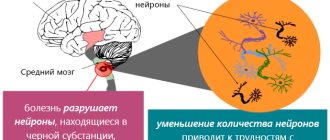Infantility is a stable personality characteristic, a complex of external and internal signs indicating the immaturity of the individual. Infantilism is personal immaturity. An infantile person is distinguished by childishness in actions, judgments, reactions, and appearance. We are talking about both a physical lag of one or two stages of age development, and a psychological one. If both occur, then this is harmonious infantilism.
Few people understand that infantilism is a psychological problem; more often, infantilism is mistaken for a feature of character and personality. As a rule, infantile people look much younger than their age and are characterized by increased emotionality, naivety, and capriciousness. Now let’s look in more detail at what infantilism and infantilism are in psychology in simple words, and also define the signs of infantilism and the causes of infantilism. Let's start by analyzing the meaning of the words “infantility” and “infantilism”.
What is infantility
What does infantility mean? Let's give a definition. The name is derived from the Latin word infantilis, which means “childish”. The term infantilism is derived from the same word. That is, infantilism and infantilism are mental and/or physical underdevelopment of the individual. For example, a person may be 30 years old, but he looks like he’s 20, but talks like he’s 12. His clothes, hairstyle, interests, preferences in music, timbre of voice, entertainment, social circle, etc. all hint that the age in the passport is not corresponds to the psychological age of a person. Such people are called infantes.
Often in psychology the terms infantilism and infantilism are equated, but there is still a slight difference between them. Infantilism refers to the phenomenon of childishness as such, and the word infantilism is used in relation to a specific person, action, judgment, etc. According to another theory, infantilism is a popular interpretation of the professional term “infantilism”, that is, there is no difference in the essence of the concepts at all. Later in the article we will consider these terms as synonyms.
Note! Developmental delays may be noticeable on one or both levels: physical and psychological.
Where does it come from
Infantility is the result of destructive upbringing in the family. Let's look at parenting models that lead to infantilism:
- Overprotection. Parents decide everything for the child, protect them from any life problems and difficulties. As a result, a person turns out to be unprepared for adult life. He does not have developed self-care skills, he cannot take care of himself, feed himself, provide housing, resolve some everyday issues in public service institutions, etc. Sometimes it gets to the point that a person, for example, cannot make an appointment with a doctor and go to the hospital.
- "Idol of the family." The child's every whim is satisfied, he is worshiped, his parents sacrifice themselves for him. Growing up, a person is faced with a harsh reality: those around him are not ready to worship him just as thoughtlessly. But the man himself remains that capricious child, which is why he has problems in his life.
- Authoritarianism. Parents suppress the child, ignore his desires and needs, and are not interested in his opinion. The result is the same as with overprotection - the child gets used to having everything decided for him and grows up with this attitude. The difference is that with overprotection, the subject more often remains attached to his parents, and with an authoritarian parenting style, he leaves his parents and enters into other codependent relationships, where he is again suppressed and humiliated.
- Permissive style. Parents are not at all interested in the child’s life and do not prepare him for an independent adult life. It develops according to the principle “whatever grows, grows.” But the result here is not so clear. Some children, left to their own devices, on the contrary, grow up early. Especially in cases where they have to take care of younger brothers and sisters. However, it also happens that a person grows up, but remains on the psychological level as that same wandering child who “sticks” first to one person and then to another.
Thus, the foundations of infantilism are laid in childhood. It's all about the pedagogical mistakes of parents. They do not want to let their child go because of personal fears, unprocessed traumas and other psychological problems. How to tie a child to yourself forever? Make him an infant, dependent on his parents.
Interesting! Children with infantile parents often, on the contrary, mature early. They have to take on the role of a parent and be responsible for their moms and dads. This model is also incorrect and carries its own risks, but this is a topic for another article.
Characteristic manifestations
A person may be afraid to take responsibility, be responsible for his actions, make decisions
Infantility can manifest itself differently in different situations. It can characterize your attitude towards your health, starting a family, and marriage. The thinking and character of an infantile person are practically indistinguishable from the thinking of a child. Personal immaturity manifests itself both from a social and psychological perspective. Characteristic signs of infantilism include:
- inability to make decisions without assistance;
- lack of independence;
- unpredictability;
- lack of desire to make adult decisions;
- irresponsibility;
- reluctance to develop;
- self-centeredness and selfishness;
- dependent tendencies;
- lack of life goals;
- addiction tendency;
- inadequacy;
- disturbance of perception;
- failure to adapt;
- lack of social advancement;
- difficulty in communication.
An infantile person can be identified by behavioral characteristics.
- Such people are in no hurry to answer for their actions; they will happily hide behind the backs of their friends, wives or parents.
- The infant lives playfully. Such a person is fond of shopaholism, attends parties, and hangs out in computer games.
- He is unable to conduct introspection and is closed in on his personality. Because of this, difficulties arise in understanding other people, the realization that others may perceive the world around them differently.
- Does not know how to take into account the interests of other people. This leads to difficulties in communication. It's hard to make new acquaintances and make contact with people. The phrase “no one understands me” is typical.
- A person has no goals in life, he lives for today.
- He does not know how to predict the future or make plans. Does not build strategies in behavior in order to achieve certain goals. He rejoices in results that can satisfy his needs at the moment.
- In almost all cases, the infantile personality is low-income, has difficulty finding a job, and has no career advancement.
- Looking at an infantile person, you can see a shade of irony or contempt, lowered corners of the lips.
In order to make sure that you are dealing with an infantile personality, pay attention to his relationship with his parents. If they are equal, the person shows care, then this is a good sign. If parents show strong guardianship, invade the subject’s space, and impose their behavior, then an infantile personality occurs.
In men
Let's look at what an infantile man is and the signs of such a condition.
- The person is incapable of action and is not ready for serious relationships with women.
- He exhibits egocentrism, an obsession with his own personality. He considers himself a leader in any situation. When problems arise, he blames others.
- Inability to independently take care of yourself in everyday life. Such a husband cannot do housework. For him, it seems like a tragedy to wash the dishes or do the cleaning.
- Such men spend a lot of time playing games and can spend hours on the Internet.
- He often chooses a woman who is older than him and counts on parental care. If such a chosen one is found, the person remains a child forever.
- The man does not achieve much success in his career, often works in a low-paid position, and does not strive for anything.
- There may be no hobbies or ability for self-development.
Among women
An infantile woman is one who has never been able to grow up.
She remains a little princess. Let's look at what an infantile, immature woman is, and the signs of such a condition.
- An image of a little girl is created that makes men want to care and protect. Often, experienced men who have achieved a lot in life choose such frivolous, spoiled women because they allow them to relax and change their usual way of life.
- Such women dream of meeting a young man who would play the role of daddy. When looking for a potential groom, they are looking for a courageous, wealthy partner.
- An infantile girl finds herself in extreme situations, in bad stories, and constantly needs to be saved.
- Such a young lady is more likely to wear a sporty type of clothing, often reminiscent of children's outfits, with more sparkles, rhinestones, and prints.
- Such a woman, as a rule, has many friends. She is cheerful and energetic. Her social circle is represented by people who are younger than her. Men with such a woman are never bored.
- An infantile young lady may not actually be like that. Such a model of behavior may be a forced measure. A girl manipulates her partner in this way; she can pretend to be offended when, in fact, she is very angry, deliberately shed tears, and show a sad mood. She can pretend to be confused if she doesn’t know what she wants, she easily makes a man believe that he is in charge, that without him she will be lost and will not survive.
Infantility in children
This state is fully consistent with the development of the child’s psyche. If you pay attention in time to the relationship between the child and his parents, you can trace the beginnings of the development of adult infantilism:
- the baby can constantly evade responsibility and obligations, while the parents indulge his desires;
- In a child's life, interest in games rather than in studies predominates; parents encourage him.
Teachers may indicate possible development of immaturity when a student in class:
- plays more games;
- there is restlessness;
- cannot concentrate on any task;
- emotional instability;
- immaturity and hysteria;
- such children distract others in class;
- they don't complete tasks;
- communicate mainly with those who are younger.
Such kids suffer from neuroses and become withdrawn.
Causes
Infantility is a consequence of a failure in the separation of a child from his parents. Normally, separation begins when the child is one year old. Until a child is one year old, they are not even considered as a separate unit; in psychology it is customary to talk about a single organism - the dyad “mother and child”. Until one year of age, a child needs unity with his mother or another adult. This is how a sense of security and trust in the world is established. However, after a year, it is important to gradually give the child freedom.
At three years old, the child for the first time clearly expresses his desire to separate - the crisis of three years, or “I myself.” In adolescence, with normal development, the subject tries with all his might to get out of parental care and supervision. However, if a failure has already occurred at the previous stages, then the teenager may not try to separate from his parents.
In some cases, infantilism develops later - in adolescence or adolescence, and sometimes in early youth. This is due to the fear of life. A person perceives the world as dangerous and hostile, unpredictable, so he unconsciously decides not to grow up. If stuckness occurs in adolescence or young adulthood, then the cause of infantilism lies not in the costs of family upbringing, but in the psychological trauma received at the age where the stoppage occurred.
If we consider infantilism as a social phenomenon (some experts call infantilism a disease of modern youth), then we can identify the following factors in the emergence of infantilism:
- destruction of the family institution;
- loss of authority of the older generation;
- the fashion for eternal youth and the fear of old age due to the negative attitude of society towards old people;
- changing values (more and more people are focused on individualization and endless consumption);
- economic and social vulnerability of young people (costs of state policy);
- unstable situation in society;
- lack of motivation to grow up (even an immature person can now find a job, friends, and many parents are ready to support their child both during the period of long education and after it).
Note! Infantile people are children who, for some reason, were unable to separate from their parents in time (according to developmental norms).
Causes of infantilism
All psychologists agree that the inability to become an adult is rooted in childhood.
Among the main causes of infantility are:
- Overprotection of the mother and (or) father
. Parents control every action of the child, depriving him of initiative and personal space. The baby gets used to the fact that all decisions have already been made and thought out for him. The skills to act independently are not instilled. - The opposite situation is a lack of love, care and support in childhood
. The child was brought up in a Spartan style, did not see the affection of his parents, or they were constantly busy with their own affairs. Alienation from warmth forces an adult to look for it outside in adulthood, to make up for lost time. - Unjustified tight control
. The child has no right to a personal opinion, his phone is checked, messages on social networks are viewed. A teenager can rebel, or he can resign himself and become a completely subordinate person. - Undesirable early maturation
. A person becomes an adult too early, for example, he is going through a turbulent divorce of his parents or is busy with numerous additional education clubs. He does not have the opportunity to relax, fool around, play like most children. A strong resentment arises for the childhood taken away, and along with it revenge appears in the form of infantility.
Let us give, as an example, a few phrases that parents use to set their children up for infantile behavior:
- “I know better how to do it.”
- “This is not negotiable, do as I say.”
- “Nothing depends on you, no one asks you.”
- “We’ll figure it out without you.”
- “You can’t do anything right.”
At a conscious age, infantilism develops less frequently. These are cases when the spouse takes full responsibility for all responsibilities. Acting with the best intentions, he (she) tries to minimize the participation of the other half in any affairs, to protect her from unrest. A person gets used to this very quickly, and it is not easy to revive independence skills.
Signs of infantilism
The main, main sign of infantilism is living in your own world. It’s as if a person is in a shell that protects him from the outside, adult world.
Other signs of infantility in men and women (symptoms):
- Fear of responsibility and unwillingness to work. A man or woman either sits on his partner’s neck, or continues to live at the expense of his parents and cannot build a personal life. If two infants meet, then they do not consider it anything shameful to “milk” their parents together on one or both sides.
- Violation of agreements, failure to fulfill promises. The infant will not even come up with excuses, he will simply say: “I changed my mind.” Or he will use a childish one: “I forgot,” “My stomach hurts,” etc.
- Shifting responsibility for your life to other people. An infantile person blames other people, fate, circumstances, power, the whole world for all his troubles.
- Dependence on someone. Usually this is either a parent, or an adequately developing, psychologically mature partner, friend.
- Reluctance to make serious decisions and think about the future. An infantile person lives one day at a time, has fun, has fun. He does not want to build a career, start a family and have children; he does not think about the need to purchase housing or save money. He runs away from the problems of adult life in every possible way.
- Escaping reality. Running away from adult life, infants often find themselves not only hostage to dependent relationships, but also become addicted to games, communication on social networks, alcohol, drugs, food, etc.
- Egocentrism. Like all children, the infant craves attention and gifts. He expects those around him to cooze with him, give him their best, and talk only about him. Most infantile people tend to pull the blanket over themselves.
- Inability to admit your mistakes and your own shortcomings. Just as an infant runs away from reality, so an infantile person runs away from an honest conversation with himself.
- Inability to set goals and achieve them. Infants are guided by momentary desires and impulses. They do not know how to predict the development of a situation, build a hierarchy of motives, or set priorities.
- Naivety. An infantile person lacks pragmatism and rationality. He does not know how to compete in healthy ways, defend his opinion, or fight for personal happiness and success. He simply will not survive in the adult world if he is left to his own devices.
Important! An infantile person does not know how to take responsibility for his own life, and certainly cannot take care of someone else.
What is infantilism in psychology?
Infantilism: what is it? First of all, this is backwardness in spiritual and personal development. Regardless of age, such people remain children, with the thinking inherent in children. The term refers to the concepts of immaturity, unformed personality. This is not a mental illness, but a minor deviation not associated with mental pathologies.
Infantilism - in psychology this means lagging behind. The word itself means “childish” in French. Literally this means that a person is stuck at the previous level of development. A distinctive feature is the reluctance to take responsibility, make decisions, and solve problems.
An adult, when a problem arises, will look for solutions and will do everything to avoid finding himself in such a situation again. An infantile person will prefer to hide from the problem, blame the whole world, withdraw into himself or go on a drinking binge.
Mental infantilism is the scourge of our time, the older generation says so, and it’s hard to argue with that. If there is an infantile person in the family, this will most likely be passed on to the child. Children tend to copy their parents’ behavior patterns, for him this is the norm.
It is especially difficult for boys; they are not able to bear responsibility for the family, even if they have children of their own.
In 90% of cases, such a marriage immediately falls apart. An infantile father cannot cope with responsibility, and if the child is also born sick, such a marriage is doomed to failure.
Kinds
In addition to psychological trauma and costs in family education, brain damage and mental disorders lead to the development of infantility. Thus, infantilism can be congenital and acquired. On the basis of this, in psychiatry and psychology it is customary to distinguish the following types of infantilism:
- Organic. Infantilism, as one of the manifestations of delayed mental development, is associated with damage to the central nervous system, for example, as a result of infections, intoxications, injuries.
- Somatogenically caused infantilism. It occurs due to hormonal imbalances and damage to internal organs.
- Psychogenically caused, or psychological infantilism. Arises due to costs in family education.
In addition, there are two more types of infantilism: total and partial infantilism. But we will talk in more detail about the characteristic manifestations of these types of infantilism in the next paragraph, highlighting particular forms of infantilism.
Female infantility
Women and men have similar infantilism, but they are still different. Typically, female infantilism can be described as: a small, capricious princess, and everyone around her is a servant or something like that. There are many extremes here, so let's look at the signs of female infantilism more specifically.
Read more: What is Serotonin and why is it important for success in life!
Fear of responsibility
In general, this is a common practice among girls. Or rather, many girls are afraid of responsibility and they want a man to decide for them more. Good or bad, I don't know. But I think a girl should still take responsibility for herself, and just negotiate with a man on any issue.
Selfishness
An infantile woman thinks only about herself and this is understandable, since she believes that the world revolves around her, and everyone around her should serve her, run, jump and entertain her.
"Everyone owes me"
A standard manifestation of immaturity. If a girl is raised as a princess from an early age, then she becomes a princess, where everyone around her jumps, runs and tries in every possible way to please. She gets used to this world and attitude towards herself and at the same time goes to build relationships. And, of course, if a girl is very beautiful, she will definitely find her daddy, who will look after her and give her gifts in every possible way.
Harmfulness
Infantile girls are very harmful. And this is connected, as usual, with an excess of attention to her person. She is spoiled and selfish. She will test any guy on her way with her harmfulness. If a guy is taken in by her harm, then he can be manipulated in any way he likes. If a guy is confident in himself, he can calmly put such a girl in her place and open her eyes that the world does not only revolve around her.
Usually a girl immediately falls in love with such a guy, since he has destroyed the standard model of behavior. But the girl just wanted male strength.
Shifting problems onto others
Oh, how such girls do not like to solve their problems. They often run away from them, and the easiest way is to blame personal problems on the guy who is in love with her. And there can be a lot of such guys, and each one decides what she cannot decide for herself.
Psychologists would NOT want you to know these secrets about yourself
—Imagine this situation...
What if, instead of paying for years for useless consultations with a psychologist, in 21 days you can work with yourself? Get rid of negative thoughts and states forever. And instead live a calm and happy life? Stop living in stress due to relationships or constant lack of money?
Tell me this is impossible?
I thought so too, until I started working with myself
LIVING HAPPY IS EASY
My name is Ivan, I am 35 years old, and I have been practicing psychology for 15 years. I have studied all the basic methods and techniques through which I help people find happiness. NLP, hypnosis, body-image therapy. I was invited on television as an expert.
And it was... just a nightmare!
I lived in a state of depression for 7 years (constant stress exhausted me). I had a lot of low self-confidence (my self-esteem was below 0). I could not calmly communicate with people, it seemed to me that I was not worthy of them.
The relationship did not work out (because I was very negative, jealous, a doormat). I’m generally silent about decent earnings; I earned 15,000 rubles a month and thought that was the limit. I didn’t want to live... Envy.
The worst thing is, I thought I would have to live like this forever, and I don’t deserve love and happiness.
But it only got worse, negative states fell on me like a snowball. It felt like I was sitting in a deep, black hole from which there was no way out. Hopelessness, despair, pain, resentment.
My life has turned into endless torture. But then a miracle happened...
I FOUND THE KEY... EVERYONE HAS IT...
One day my father came home from work, a little drunk, although he never drank much.
He came into the kitchen..., looked at me with a dissatisfied expression and began to say with anger how worthless I was, how I couldn’t do anything, and in general, how sorry he was that he was my father.
At first I felt severe mental pain (this is very painful to hear from my family). Then I got offended (does that mean I’m not a favorite son?!) And then an insight came to me...
I received that magical kick that I had been waiting for all my life. It changed my thinking, my life and my relationships with my environment.
I had already forgiven my father simply because he told me the truth and I was happy about it!
But then the most interesting thing began...
Literally 5 minutes later I was already sitting at the computer and writing out all the psychological (!) methods of working with myself.
I was even confused, because my plans were to continue to suffer all my life.
It was such an incredible feeling of freedom and desire to do something that I burst into tears of happiness.
THE MAIN SECRET OF HAPPINESS
If you think that you cannot change your life, become rich or successful, or create a happy relationship - you are mistaken!
You can change your life by changing your thinking and the main thing is to do it EASILY!
• 5 simple and powerful methods of working with yourself (they work even if you use them incorrectly) - You don’t have to turn to psychologists, you are your own psychologist.
• “The secret method” of working through any negative state. This will allow you to eliminate the negative and switch to the positive in 5 minutes.
• 15 minutes a day - Just 15 minutes a day to change your life 180 degrees. Become happier and more joyful.
• Saving up to 100,000 rubles in 1 year - You will save on trips to a psychologist, and spend the saved money on a vacation by the sea.
• 21 days – It only takes 21 days for you to see changes in your life. You will start smiling. Wake up with joy.
DOWNLOAD THE “GUIDE TO CHANGING YOURSELF” FOR FREE
For 7 days, access to the “Guide to Changing Yourself” will be free, everyone can download it from Telegram using the button below.
PS If you want to say “thank you” to me, just download the guide and start using it every day.
PPS How about becoming happy today? =)
Not admitting your mistakes
It's all the fault of men or the government. If only both of them were normal, everything would be fine, period. But the fact is that she is the mistress of her life, which she cannot understand and realize. This is where one of the main problems lies.
I can do anything, I'm a girl
This is the most terrible and dangerous path. As a car enthusiast, I see such girls a mile away, there is absolutely no respect on the road. Most importantly, he puts himself and others at risk.
There is also complete trash going on in relationships. The girl allows herself to communicate with men as she wants, without respect and disdain. Constantly checking how far he can push himself until he turns a man into a rag. But if a strong man gets in her way, he puts everything in its place, all infantilism will end in the bud.
Forms of infantilism
Infantilism can manifest itself in only one area of life. Let's look at it with an example. A person is an excellent specialist, provides himself well, but at the same time he cannot build a personal life and is not able to make long-term plans, for example, about purchasing his own home. He spends everything he earns on entertainment, trinkets, clothes, etc.
Many people are distinguished by legal or financial infantilism, but at the same time they reason in a completely adult way in any other issues. Therefore, in psychology it is customary to distinguish several forms of infantilism.
Forms of infantilism:
- Psychological or socio-emotional infantilism. We are talking about underdevelopment of the emotional-volitional sphere. A person’s actions, judgments, reactions, and behavior do not correspond to the age norm. Usually, getting stuck occurs in adolescence, that is, a person is prone to aggression, is categorical and hot-tempered, impulsive, and unstable. He does not want to learn, work, develop. He wants to spend time carefree, living life.
- Social infantilism, or everyday. A person cannot go to the store on his own, cook his own food, or keep his apartment clean. In fact, problems often arise with finding an apartment, renting housing and paying for it. In addition, a person has difficulties entering society. Forms of manifestation of problems: isolation and self-isolation, communication with virtual friends, communication with people who are much younger in age.
- Legal infantilism. This is ignorance of one’s rights and responsibilities, an inability to fight for one’s rights. Some infantas break the law, ignore the public and unspoken rules of life in society and the state. Other people cannot get what they are legally entitled to. For example, many young mothers do not know what payments they are entitled to from the state or employer.
- Physiological infantilism. The man looks younger than his years. Often infantile people look like teenagers. For example, women are stuck in the body of a teenage girl without distinct secondary sexual characteristics.
Important! Infantilism should not be confused with a deviation or developmental delay. Infants do not suffer from intellectual development; they have problems in the emotional-volitional sphere.
Infantility is a “disease” of modern youth.
To become rich and successful, you need to completely get rid of immaturity. Unfortunately, infantiles do not want to develop, but only show selfishness.
And nothing will change, your whole life will pass in vain, and the torment of a wasted life will always torment you.
The only thing that will make an infant happy and successful is working with the inner child; if the inner child grows up, then the problem will be solved.
Sign up for a consultation using the button below if you want to be guaranteed to change your life and become successful.
Sign up









